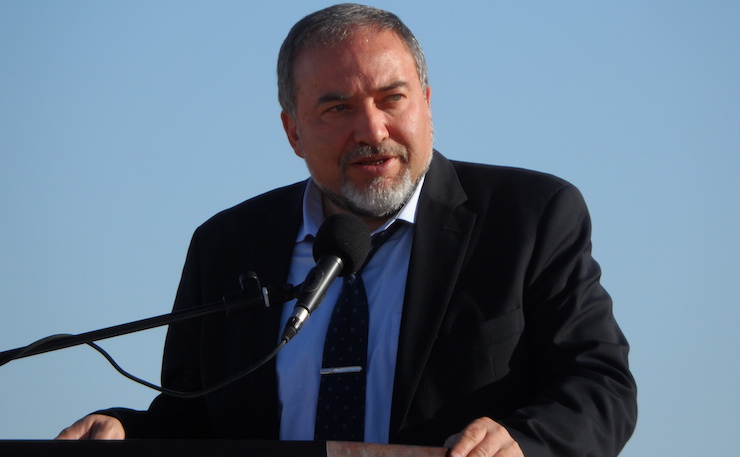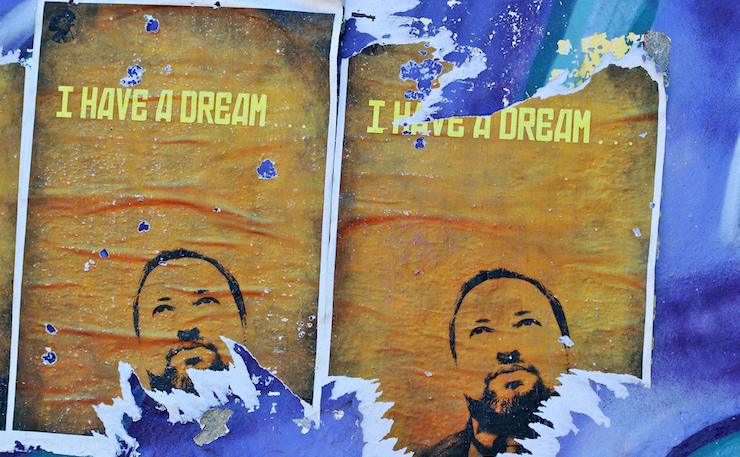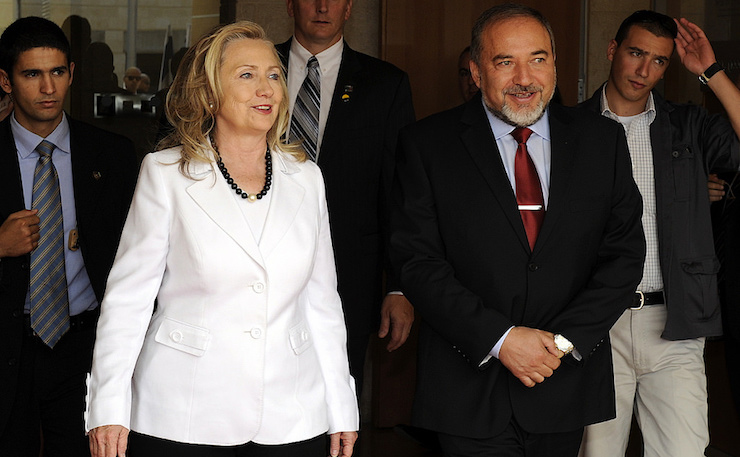The failure of Israeli liberalism has made the ascent of a far-right and openly racist leader sadly in keeping with the country’s mainstream politics, writes Michael Brull.
By the time you read this, Avigdor Lieberman, leader of the right-wing Israeli party Yisrael Beiteinu, may be Israel’s new Defence Minister. In this article, I want to set out who he is, who he will replace, the context, and the significance of Lieberman’s rise.
They Can Take Their Bundles And Get Lost: Liebermanism
Lieberman led an election campaign in 2009 with the slogan “no loyalty no citizenship”. He frankly advocated revoking citizenship for the “disloyal”, and even a “right of expulsion”. It was understood that this referred to Israeli Arabs. Lieberman is frankly opposed to liberal values. He has explained that when Zionism and democracy clash, “the Jewish and Zionist values are more important”. He has also advocated, in the context of a two-state agreement, transferring parts of Israel with large Palestinian populations out of Israel, and into the Palestinian state. This would strip those people of Israeli citizenship, effectively disfranchising them and transferring them into another country.
Veteran Israeli journalist Akiva Eldar reported that Lieberman offers even more extremism to his supporters when speaking in Russian. In 2004, Lieberman said to the local weekly Tel Aviv – “essentially, that it is necessary to transfer 90 per cent of Israel’s Arabs to the territories, including residents of Acre, Jaffa and Sakhnin.” The less extreme version of Lieberman said, “They have no place here. They can take their bundles and get lost.”
Lieberman thought the way to achieve a “real victory” in the attack on Gaza in 2008-2009 was by treating the Palestinians like the Japanese were treated “in the last days of World War II”. He also threatened to bomb the Aswan Dam in Egypt in 2001. This would have killed millions.
Reports in Ha’aretz suggest that he used to belong to Kach. For those who are unfamiliar with it, it was a theocratic terrorist organisation, led by the eventually assassinated Rabbi Meir Kahane. Scholar of Israeli extremists Ehud Sprinzak wrote that a “typical speech” by Kahane included warnings that the “Arabs are cancer, cancer, cancer in the midst of us”. If Kahane were allowed two months as defence minister, “you will not have a single cockroach around here! I promise you a clean Eretz Yisrael”.
In more recent years, Lieberman and his party have pushed a raft of anti-democratic legislation within Israel. Last year, he said that Arabs “who are against us, there’s nothing to be done – we need to pick up an axe and cut off his head”. During the war on Gaza in 2014, he urged a boycott on Arab businesses striking against the war. More recently, he has supported the Israeli soldier who murdered an unarmed Palestinian lying on the ground.
How Lieberman Got The Gig

Moshe Ya’alon is the Defence Minister who resigned, paving the way for Lieberman. After the Israeli soldier murdered an unarmed and injured Palestinian, it was clear that the public was on the murderer’s side. Israeli Prime Minister Netanyahu briefly condemned the murder, before changing his position to suit public opinion. Ya’alon did not, which Israeli journalist Anshel Pfeffer described as political suicide.
On May 4, another controversy arose on Holocaust Remembrance Day, when the deputy chief of the Israeli army, Major General Yair Golan, compared Israel to Nazi Germany, saying there were “signs of them here among us today”. Netanyahu rebuked Golan, as did most of Israel’s right-wingers. Then Ya’alon, speaking to Israeli army officers, urged them to speak their minds, and to be “brave not just in the battle field, but also at the discussion table.” Even if they weren’t part of the mainstream, even if it differed from “political leadership”. Shortly afterwards, Netanyahu summoned Ya’alon to a meeting. It was claimed that the purpose was to clear the air, and he certainly had no intention to relieve Ya’alon of his position as Defence Minister. Naturally, it was only a few days before Netanyahu dumped Ya’alon and offered the position to Lieberman.
Ya’alon: The Moderate Who Called Palestinians A Cancer
Since being dumped as Defence Minister, Ya’alon has sought to reinvent himself as a principled opponent of extremism and racism, who has struggled to defend decency. He wrote on Facebook that “I fought with all my might against manifestations of extremism, violence and racism in Israeli society, which are threatening its sturdiness and also trickling into the IDF, hurting it already”. He said “to my great sorrow, extremist and dangerous elements have taken over Israel and the Likud Party and are shaking the foundations and threatening to hurt its residents. Sadly, senior politicians in the country have chosen the way of incitement and segregation of parts of Israeli society instead of unifying it and bringing it together.”
As the great Israeli journalist Gideon Levy observed, Ya’alon “was IDF chief of staff during the Defensive Shield offensive in the West Bank in 2002 and for Operation Days of Penitence in Gaza in 2004, operations that sowed horrifying death and destruction. Perhaps it was then that the bestialization of the IDF began.” Ya’alon was also the Defence Minister during the last war on Gaza, killing over 2000 Palestinians, including over 500 children. Even the pathetic whitewash of a UN report noticed the tactics may not have been totally moral, commenting on “the razing of entire areas of these localities by artillery fire, air strikes and bulldozers”.
Ya’alon has also lashed out against human rights organisations and progressive NGOs. Breaking the Silence is a courageous organisation that publishes collections of testimonies from Israeli soldiers about what they do in the occupied territories. Ya’alon said they have “malicious motives” and banned them from events with the Israeli army. A few months ago, Ya’alon accused them of treason. Later he slightly qualified this claim, saying “We are looking into the matter.” This wasn’t glib rhetoric – he actually did order an investigation.
In 2002, Ya’alon compared the Palestinians in the occupied territories to cancer, and claimed he was merely “applying chemotherapy”. In the years leading up to 2008, Ya’alon worked at right wing think tanks, “emerging as one of the most forceful critics of two-state-solution orthodoxy,” according to Ha’aretz.
Back in 2009, Ya’alon called Peace Now a “virus”. This caused some controversy, but the context makes it worse. He said to “save the country… we must deal with the issue of the virus that is Peace Now and, if you will, the elites, their damage is very great. From my point of view Jews should live in every part of the Land of Israel forever.” That is, continue colonising the West Bank, and oppress the Palestinians forever. His comments were made at a meeting of the Jewish Leadership Movement, the Feiglin movement within Likud.
While Ya’alon now weeps crocodile tears over extremists taking over Likud, Moshe Feiglin is no less extreme than Lieberman. Feiglin referred to the Palestinians as “inferior” and “parasites”, positively agreed that Zionism is racist, and even found much to admire in Hitler and Nazism. In 2014, he called for concentration camps in Gaza, after using “maximum firepower”, cutting off their water and electricity, and giving a “generous economic support package” to Gazans to leave to other countries.

Lieberman In Context
Much of the political outcry in Israel about Lieberman’s rise by mainstream political figures is about as credible, with war criminals like Tzipi Livni and Ehud Barak rushing to call Lieberman’s appointment a sign of fascism. Most of the Israeli political mainstream is infected with racism and war crimes. Lieberman is only unusual for being more overtly racist, and having less blood on his hands due to having less power.
For example, Ehud Barak was Defence Minister of Israel during the first massive attack on Gaza in 2008-2009. He was the Prime Minister who destroyed the viability of the Israeli Zionist left by saying there was no partner for peace after the Camp David debacle in 2000. He followed this up with his response to the Second Intifada – firing a million bullets within a month. In an interview with historian Benny Morris, he explained frankly that Palestinians can’t be trusted because “They are products of a culture in which to tell a lie…creates no dissonance. They don’t suffer from the problem of telling lies that exists in Judeo-Christian culture. Truth is seen as an irrelevant category.” Sophisticated racism like that is even fit for American liberals in the New York Review of Books.
Tzipi Livni, regarded as a dovish centrist, stated plainly in negotiations with the Palestinians that “I am against law – international law in particular.” Livni also repeatedly suggested in negotiations that Palestinian villages within Israel be transferred to a Palestinian state, thus embracing the Lieberman plan. She bragged that Israel “displayed real hooliganism” during the attack on Gaza in 2008-9: “which I demanded”. The point of the attack was that it “restored Israel’s deterrence … Hamas now understands that when you fire on its citizens it responds by going wild – and this is a good thing.”
Overt racism among Israeli political officials is by now almost standard. Israel’s Minister for Culture referred to Sudanese people in Israel as a “cancer”. Israel’s Justice Minister posted an article referring to Palestinian children as “little snakes”, advising that their mothers be killed to prevent the raising of more “little snakes”. Israel’s Deputy Defence Minister, in charge of the Civil Administration of the occupied territories, said that the Palestinians “are beasts… not human”, and that Jews have “a much higher soul than a gentile, even if he is a homosexual.” The Education Minister said to a Palestinian MK “When you were still climbing trees, we had a Jewish state here”. And “I have killed lots of Arabs in my life – and there is no problem with that.”
The Significance Of Lieberman’s Rise
In a military-obsessed country, Lieberman’s lack of military experience has often been counted against him. As Defence Minister, Lieberman will probably get the chance to put his own stamp on the next Gaza massacre. While he has often attacked the government from the right for being too soft on Palestinians, in power he will have to trade demagogy for policy. If he believes his own rhetoric and tries to implement it, disaster looms for the Palestinians, and even for Israel. However, if Lieberman serves as Defence Minister with some prudence, and doesn’t show any obvious signs of incompetence, he could put himself in a strong position to become Prime Minister.
Seven years ago, I observed that the political mainstream could have marginalised Lieberman into irrelevance in the 2009 election. It didn’t happen. On the left, Barak criticised him for lack of military experience – he was only “big on words, not on action”. The lack of meaningful opposition to Lieberman’s authoritarianism and racism helped legitimise him. Liebermanism has meant the dismantling of vestiges of liberalism for Jews in Israel, and the use of overtly racist rhetoric. Since then, both have become standard. Every election has included political competitions to appear tough on Arabs and Israeli leftists, and most major parties have supported his legislative agenda, and even embraced it as their own. Lieberman as Defence Minister isn’t a shocking development, but a logical culmination of where Israel has been heading for years.
Donate To New Matilda
New Matilda is a small, independent media outlet. We survive through reader contributions, and never losing a lawsuit. If you got something from this article, giving something back helps us to continue speaking truth to power. Every little bit counts.





